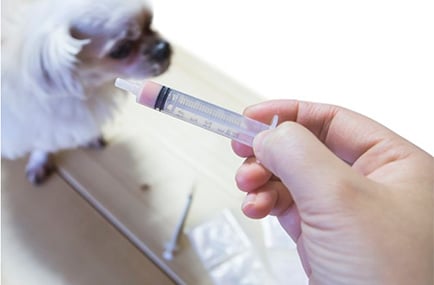Table of Contents
Key Takeaways
- Meloxicam is a nonsteroidal, anti-inflammatory osteoarthritis drug used in both humans and dogs.
- Dosing is important when giving meloxicam to dogs; human tablets can lead to overdosage when given to dogs.
- Meloxicam overdose in dogs can cause a variety of severe symptoms.
- The most common side effect of meloxicam in dogs is decreased appetite and vomiting.
- Contact a vet ER clinic or call a pet poison helpline if you think your dog has taken too much meloxicam.
Ask any person with osteoarthritis and they’ll tell you that it hurts. Dogs would tell you the same thing if they could talk. Even if your best friend can’t tell you he’s in pain, you’re pretty likely to notice if your pooch is acting like his joints are aching. One way you can help him is to give him medication like meloxicam to ease the pain.
What is Meloxicam?
Meloxicam, also called Metacam, Mobic, or Loxicom, depending on the manufacturer, is a nonsteroidal anti-inflammatory osteoarthritis drug used for both humans and dogs. It reduces pain, stiffness, and inflammation associated with arthritis. It may also be prescribed to dogs to ease pain and swelling after a surgical operation.
Mobic is a name-brand drug and is typically only prescribed for humans. Generic meloxicam, as well as veterinary name brands Metacam and Loxicom, can be prescribed for dogs by a veterinarian.
Giving Meloxicam/Metacam to dogs
While the drug itself is the same when given to humans or dogs, the dosage is drastically different. Humans receive much higher doses of this medication than dogs. The smallest human dosage of Mobic is a 7.5 mg tablet, and even a 45-pound dog would take only a quarter of the smallest human tablet. If you give your dog a whole Mobic tablet, your dog would almost certainly overdose.
Meloxicam for dogs is sold as a liquid medication, which makes administering the right dosage easier and keeps your dog safe. Your vet will give you instructions on proper dosage and administration techniques. The drug should be administered in a dosing syringe. While meloxicam may be administered directly into the mouth of a larger dog, it is often given indirectly to smaller dogs by putting it in their food.
Although a very large dog may technically take a portion of a Mobic tablet safely, getting an accurate dosage using human tablets is very difficult for most dogs. You should never give your dog any medication unless it was prescribed by your veterinarian.
Metacam for dogs side effects
Like all medications, meloxicam may cause side effects. The most common side effects are vomiting and decreased appetite. Call your vet immediately if you notice any side effects.
Less common side effects include changes in bowel movements, changes in behavior, jaundice, increased drinking, changes in urination, skin irritation, and unexpected weight loss. The most serious side effects include stomach ulcers, unusual bleeding, and loss of kidney function or kidney failure.
Signs of overdose
When administered properly with an oral syringe, the chances of overdose should be minimal. An overdose can be deadly to a dog, though. If you suspect your dog has overdosed on meloxicam, contact your veterinarian immediately. You can also watch for the following symptoms: loss of appetite, diarrhea, vomiting, dark or tarry stool, increased urination, increased thirst, pale gums, jaundice, lethargy, fast/heavy breathing, poor coordination, seizures, and/or behavior changes.
Visit the local emergency veterinary clinic or call the Pet Poison Helpline if you notice any of these symptoms, or if you believe your dog may have received too much medication.
This article is provided by Cuteness—the go-to destination for passionate pet parents. Cuteness has answers to all of your health, training, and behavior questions – as well as the cutest, funniest, and most inspiring pet stories from all over the world.
Want to make sure your pets are covered from those unexpected illnesses or injuries with no limits on payouts? Get a quote and make sure you’re covered for those dog and puppy mishaps and unpleasant surprises.








